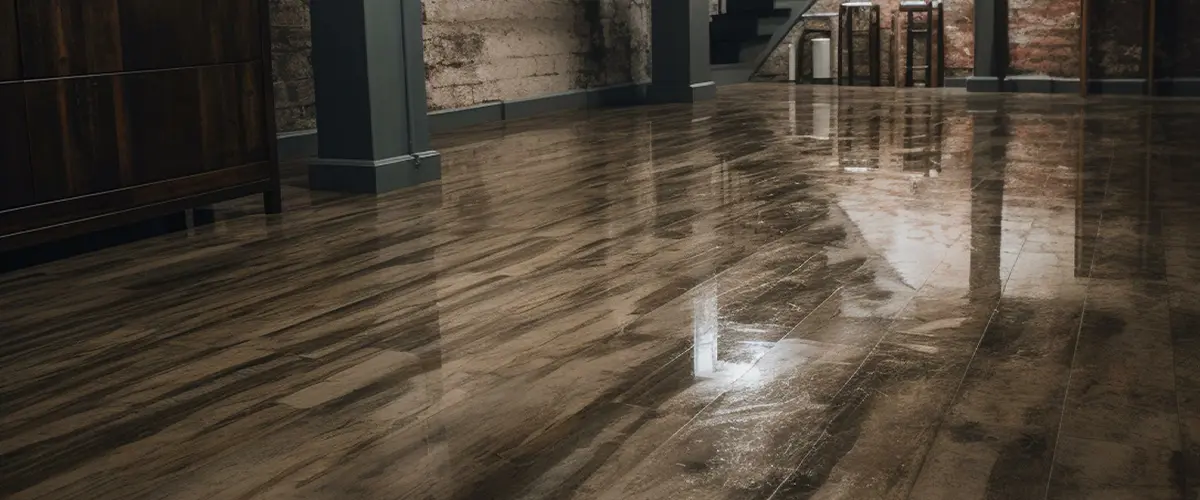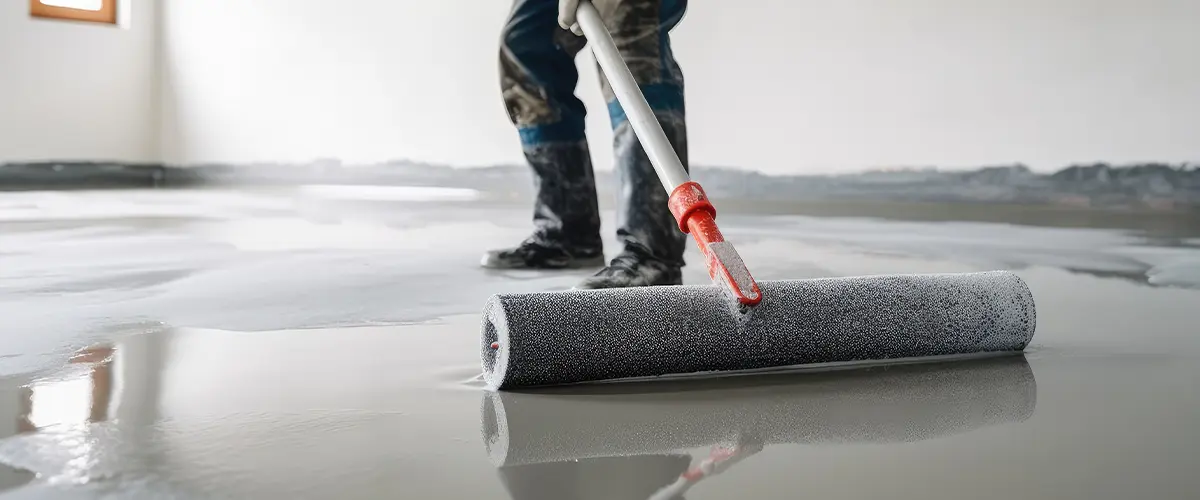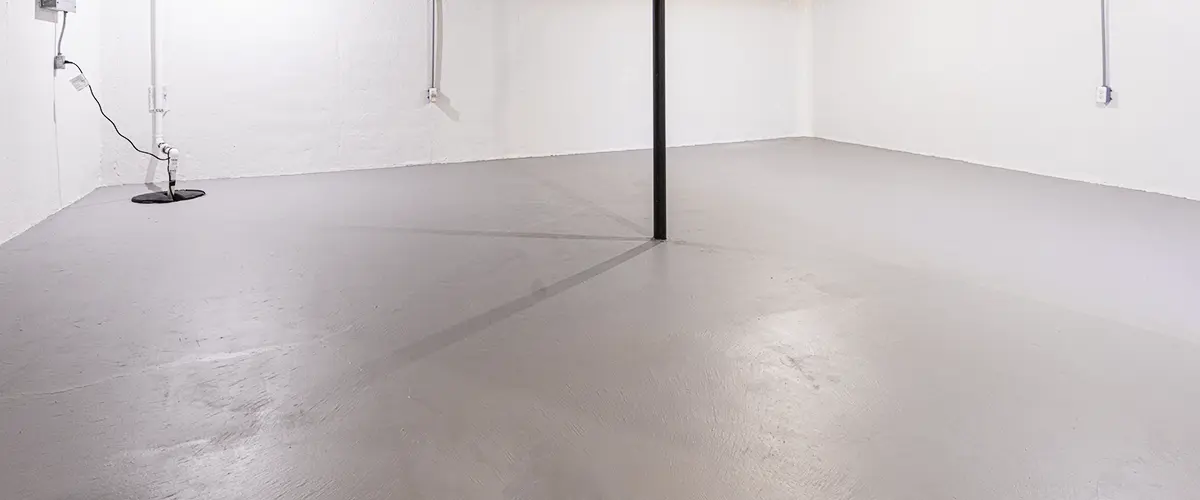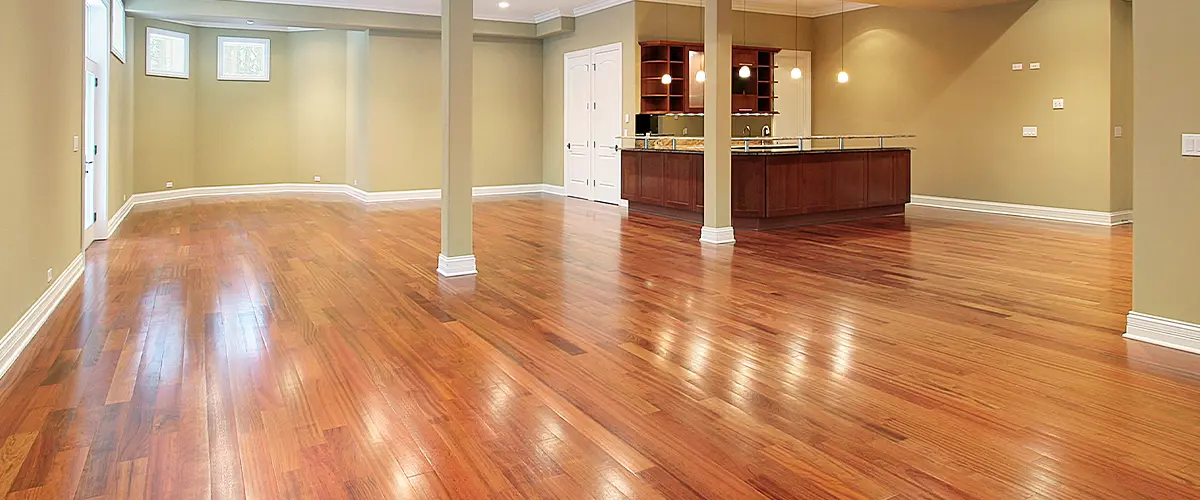The right flooring can make all the difference in keeping your basement space dry and functional.
Moisture and water-resistant flooring are important upgrades if you want to enjoy your basement and reach its full potential.
Here are some of the best types of flooring for a wet basement.

Tiles with vapor barrier for Basements
Tiles with a vapor barrier are an excellent choice for wet basements, especially in areas prone to moisture. These tiles keep moisture out, ensuring your basement floor stays dry and damage-free.
A vapor barrier is a protective layer that prevents moisture from seeping from the concrete subfloor into the tiles. This makes them resistant to mold and mildew, which are common in damp areas. Installing this flooring adds an extra defense against water damage. The interlocking design creates a seamless look and prevents leaks between tiles.
They come in various styles – ceramic, luxury vinyl, or stone – offering protection and aesthetic appeal. Their durability keeps maintenance low, making them a smart investment for basement renovations in humid environments.
| Pros Of Tiles With Vapor Barrier | Cons Of Tiles With Vapor Barrier |
|---|---|
| Moisture Protection: The primary advantage of tiles with a vapor barrier is enhanced moisture protection. The vapor barrier helps prevent moisture from penetrating the subfloor, reducing the risk of mold growth, water damage, and other issues associated with excessive moisture. | Installation Complexity: Installing tiles with a vapor barrier can be more complex than installing tiles without one. Ensuring a proper and effective vapor barrier installation requires attention to detail, and improper installation can compromise its effectiveness. |
| Durability: Tiles are known for their durability, and when combined with a vapor barrier, they can withstand moisture-related challenges more effectively. This can lead to a longer lifespan for the flooring, especially in areas prone to high humidity or occasional spills. | Cost: Tiles with a vapor barrier may be more expensive than traditional tiles without this feature. The additional cost includes the material itself and potential installation expenses, as ensuring a proper vapor barrier installation may require professional expertise. |
| Easy Maintenance: Tiles are relatively easy to clean and maintain. The presence of a vapor barrier adds an extra layer of protection, making it easier to wipe away spills and prevent stains caused by moisture infiltration. This ease of maintenance can be advantageous in both residential and commercial settings. | Limited Flexibility: While tiles are durable, they may not be as flexible as other flooring options. In environments where the subfloor experiences significant movement or settling, the rigidity of tiles can lead to cracks or breakage over time. |
| Temperature Regulation: A vapor barrier can improve temperature regulation by preventing moisture from seeping into the subfloor. This is particularly beneficial in environments where temperature fluctuations are common, as it helps maintain a stable and comfortable indoor climate. | Moisture Trapping: While the vapor barrier prevents moisture from entering the subfloor, it may trap moisture if not installed correctly. This can lead to condensation between the tile and the subfloor, potentially causing long-term problems if not addressed promptly. |
Epoxy paint for Basement Flooring
For waterproofing basement floors, epoxy paint is a robust solution. This coating resists moisture, preventing damage in wet basements. It also creates a seamless, durable surface that resists mold and mildew growth.
Epoxy adds a sleek, high-gloss finish to concrete floors while repelling stains. To ensure adherence and longevity, prepare the concrete base carefully before applying epoxy paint. It forms a strong barrier against humidity penetration, making it an ideal defense for basements in moist conditions.
Choose from various colors to complement your space without compromising practicality.
| Pros Of Epoxy Paint | Cons Of Epoxy Paint |
|---|---|
| Water Resistance: Epoxy floors are highly resistant to water, preventing water damage and mold growth. | Installation Complexity: Professional installation is recommended due to the complex process involved in preparing and applying epoxy. |
| Easy to Clean: The seamless surface of epoxy makes it easy to clean, ideal for basements with frequent spills and splashes. | Susceptibility to Damage: Epoxy floors can be scratched or damaged by sharp objects or heavy impacts over time. |
| Aesthetic Options: Epoxy offers a variety of colors and finishes, allowing for customizable and visually appealing basement designs. | Slippery When Wet: Epoxy surfaces can be slippery, posing a slip hazard in wet conditions, although non-slip additives can be used. |
| Chemical Resistance: Epoxy is resistant to household cleaning chemicals, maintaining its durability in a basement environment. | UV Vulnerability: Some epoxy formulations may yellow or discolor with prolonged UV exposure, necessitating UV-resistant options if exposed to sunlight. |

Sealed concrete Floor for New Basements
Shifting focus from epoxy paint, sealed concrete is a strong contender for wet basement flooring. Its robustness makes it ideal for areas with fluctuating moisture levels. Properly applied, a sealant can transform bare concrete into a waterproof barrier that meets damp conditions without succumbing to mold or mildew.
Sealed concrete is not only hardy but also versatile in design options. Homeowners can choose from various stains and finishes to match their style preferences, ensuring aesthetics are not sacrificed for functionality.
A well-sealed concrete floor requires minimal upkeep; regular sweeping and occasional mopping will keep it looking sharp and resistant to the common challenges of basement environments.
| Pros Of Sealed Concrete | Cons Of Sealed Concrete |
|---|---|
| Durability: Sealed concrete floors are highly durable, perfect for basements. | Hard Surface: The hardness of concrete can be uncomfortable; rugs or mats may be needed for added comfort. |
| Water Resistance: Proper sealing protects against water damage, making it ideal for wet environments. | Cold Temperature: Concrete tends to be cold, especially in cooler climates, requiring measures like rugs or heating systems. |
| Easy Maintenance: Sealed concrete is easy to clean with regular sweeping and occasional mopping. | Potential for Cracking: Despite resilience, concrete may develop cracks over time due to settling or temperature changes. |
| Design Versatility: Concrete floors can be stained or dyed for various colors and patterns, offering design flexibility. | Limited Resale Appeal: Sealed concrete may not have broad appeal, potentially impacting the resale value compared to more traditional flooring options in basements. |

Luxury Vinyl Tile Or Plank
Luxury Vinyl Plank (LVP) flooring is a synthetic option that convincingly mimics the appearance of natural materials like wood or stone.
Manufacturers of LVP flooring, such as Shaw, Mohawk, and Armstrong, have gained prominence for their quality and innovative designs. These companies offer diverse styles, colors, and textures, allowing consumers to choose flooring that suits their aesthetic preferences and complements their interior design.
Luxury vinyl plank flooring is considered a more cost-effective alternative than traditional basement hardwood or tile flooring, making it an attractive option for budget-conscious homeowners.
| Pros Of LVP Flooring | Cons Of LVP Flooring |
|---|---|
| Water Resistance: Luxury vinyl plank is highly water-resistant, ideal for moisture-prone basements. | Installation Temperature Restrictions: Some types have installation temperature restrictions, requiring adherence to guidelines. |
| Durability: Resistant to scratches and stains, it withstands heavy traffic for long-lasting use. | Vulnerability to Sharp Objects: While durable, it can be scratched or dented by sharp objects or heavy impacts. |
| Aesthetic Options: Offers a wide range of styles, colors, and patterns, providing a luxurious appearance. | Potential for Fading: Extended sunlight exposure may cause fading, necessitating preventive measures. |
| Comfort Underfoot: Provides a softer and warmer feel compared to cold and hard surfaces like ceramic tiles. | Environmental Concerns: Being PVC-based, it may raise environmental concerns; opting for eco-friendly options can address this. |

Factors to Consider When Choosing Flooring for a Wet Basement
When choosing basement flooring, consider moisture resistance, maintenance needs, dependability, personal preference, and budget.
Water resistance/durability
Choosing the right flooring for a wet basement demands high water resistance and durability.
In Omaha for example, frequent humidity and potential flooding make this a critical factor. Waterproof basement flooring options like vinyl plank flooring or ceramic tile come out on top for their ability to repel moisture effectively.
These materials withstand damp conditions without warping, cracking, or growing mold.
Meanwhile, luxury vinyl tile and rigid core flooring offer additional layers of protection with their tight-locking installations, which prevent water from seeping underneath.
Ease of maintenance
Keeping your basement flooring in top shape shouldn’t be a chore. Moisture-resistant flooring like vinyl plank or ceramic tile is designed to withstand dampness and is incredibly easy to clean.
Spills and splashes wipe up quickly without leaving a trace. Regular maintenance usually involves sweeping or vacuuming and an occasional mopping with water.
Luxury vinyl tile, which mimics the elegance of real wood or stone, offers similar benefits for wet basements. It stands up against moisture while requiring minimal effort to maintain its appearance over time.
Personal style and budget
Choosing the right flooring for your wet basement involves balancing personal style with how much you’re willing to spend.
If you love the look of luxury vinyl tile or engineered hardwood flooring, consider whether these options fit your budget and meet the moisture-resistance needs of a damp environment.
Some materials might capture your eye and perfectly match your home’s aesthetic, but remember that high-end options often come with a larger price tag.
Budget-friendly choices like vinyl plank flooring or ceramic tile can still offer a range of designs and patterns to suit any taste while providing the water resistance necessary for basement conditions.
Conclusion
Here at Home Matters Construction, we think the best type of flooring for a wet basement would be an epoxy or tile floor. If you have a living space and bedroom in the basement, you might a LVP floor, but if you barely spend time in there, tile is better.
Alternatively, epoxy flooring is a highly durable basement flooring option that is resistant to moisture and easy to maintain.
However, it’s important to understand one thing.
You never want to have a wet basement in your home for a long period of time. Moisture will help bacteria and mold growth, which are very harmful to our health, especially when coupled with other health problems.
Your best call would be to waterproof your basement and remodel it into a safe space. This gets you some extra living square footage, increases your home’s value, and also improves your day-to-day life.
If you want to do the right thing for your basement, home, and health, check out our basement remodeling service and forget about how it’s like dealing with a wet basement!
